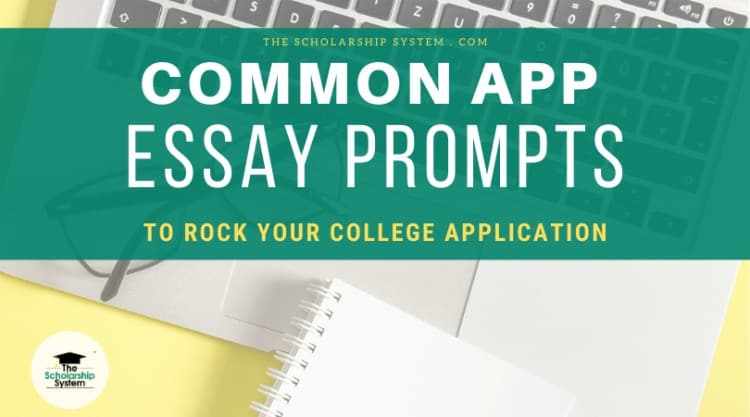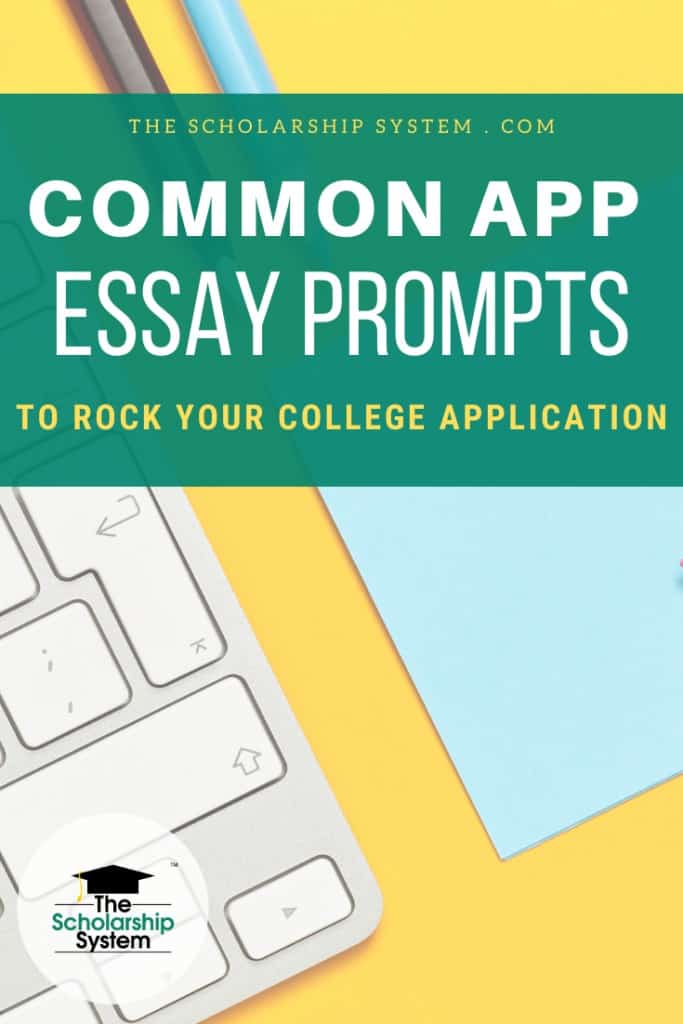Updated on March 23rd, 2021
If your student is filling out the Common Application for college, they are going to encounter the Common App essay section. Here, students are presented with a group of prompts, giving them direction as they write.
By choosing the right Common App essay prompt, your student can rock their college application. To help them along the way, here’s what they need to know about the Common Application essay.
If you and your student want to learn more about where to find local scholarships, as well as national awards, sign up for our free college scholarship webinar! Take a trip over to http://thescholarshipsystem.com/freewebinar to reserve your spot today.
What is the Common App Essay?
When your student fills out the Common Application for college, they will have an opportunity to write a personal essay to go along with the other information in their profile. A personal essay isn’t like an academic essay. Instead of showcasing their knowledge of a topic, personal essays allow students to share details about themselves, their life, their perspective, their struggles, and their triumphs.
Students who write a Common App personal essay are seizing an opportunity to tell their story. The goal is to give the admissions department insight into who they are and why they would make an excellent addition to that school’s student body. Through the Common App essay, schools have a chance to get to know the applicants, and that helps them make smart admissions decisions.
What Are Common App Essay Prompts?
When a student fills out the Common App for college, there is a writing section in the application. In that area, students will find essay prompts, a group of preselected topics that The Common Application (the non-profit organization behind the Common App) believes will help colleges make sound admissions decisions.
Students can choose the prompt they feel best showcases why a college admissions department should want them to attend. This gives the applicant a degree of power, ensuring they have a chance to tell their story. After writing an essay to align with one of the prompts, that essay can be submitted along with the other details in their Common Application profile.
What is the Common App Essay Word Limit?
There isn’t a hard-and-fast word limit for the Common App essay. However, The Common Application recommends staying around the 650-word mark.
Usually, 650 words gives students a reasonable opportunity to craft a comprehensive response, ensuring they can convey their story without having to cut any beneficial details. The recommended Common App essay word limit also helps to keep students from getting too wordy, essentially encouraging them to write a thorough yet concise piece that is designed to be as impactful as possible.
Is the Common Application Essay Mandatory?
Technically, the Common Application essay isn’t mandatory. Students don’t have to write one to complete the must-do portions of their profiles.
However, that doesn’t mean a Common App essay won’t be required by many of the schools. If your student wants to apply to a college that makes the essay a must-submit part of the application, then it is mandatory if your student wants to be considered for admission there.
Additionally, even if it isn’t required, that doesn’t mean your student shouldn’t write a Common Application essay. Your student can include it in their application to any school, and it may increase their odds of being accepted if it is well written and helps them stand out from other applicants. While the essay would be considered optional in this scenario, it’s usually best to submit it.
Do the Common Application Essay Prompts Change Each Year?
While the Common App essay prompts for the 2019-2020 application year are the same as the ones used in 2018-2019, that doesn’t mean the questions always remain the same. The prompts can change from one period to the next, so students don’t want to make assumptions about the topic ahead of the official prompt announcement.
However, in early 2019, the Common App blog did discuss the reasoning behind the decision to keep the previous year’s prompts. It highlighted the fact that the current ones gave students a significant amount of flexibility, making it easier for them to tell their story while meeting the Common Application requirements. Additionally, it mentioned the benefit of students being able to roll over accounts from the 2018-2019 period, ensuring that planning and preparation for the new batch of applications were easier to manage.
Common App Essay Topics for 2019-2020 Applications
For 2019-2020, students completing the Common App essay have seven prompts to choose from, giving them the ability to select a topic they feel they can best address. Here is a look at the prompts.
1. Some students have a background, identity, interest, or talent that is so meaningful they believe their application would be incomplete without it. If this sounds like you, then please share your story.
This prompt gives students an opportunity to discuss a passion of theirs or a bit about their history. It can be big or small, as long as it is meaningful.
2. The lessons we take from obstacles we encounter can be fundamental to later success. Recount a time when you faced a challenge, setback, or failure. How did it affect you, and what did you learn from the experience?
If overcoming an obstacle shaped your student in a fundamental way, this is a prompt that allows them to discuss that specific part of their story.
3. Reflect on a time when you questioned or challenged a belief or idea. What prompted your thinking? What was the outcome?
This College App essay question is all about beliefs and ideologies. It’s one of the harder prompts to use, as keeping the essay positive and avoiding preachiness is challenging. But it can also give your student a chance to discuss something deeply personal.
4. Describe a problem you’ve solved or a problem you’d like to solve. It can be an intellectual challenge, a research query, an ethical dilemma – anything that is of personal importance, no matter the scale. Explain its significance to you and what steps you took or could be taken to identify a solution.
With this question, students can showcase their problem-solving skills, passions, and perspective. It can also give your student room to be creative or highlight a unique idea.
5. Discuss an accomplishment, event, or realization that sparked a period of personal growth and a new understanding of yourself or others.
This prompt gives students a chance to discuss anything that helped them grow as a person, no matter how big or small the catalyst may seem to be.
6. Describe a topic, idea, or concept you find so engaging that it makes you lose all track of time. Why does it captivate you? What or who do you turn to when you want to learn more?
Here, students can focus on their passions and interests. Additionally, it gives them a chance to discuss their motivations as well as provide insights into how they learn.
7. Share an essay on any topic of your choice. It can be one you’ve already written, one that responds to a different prompt, or one of your own design.
If your student wants to discuss something that isn’t covered in a prompt above, here’s an option for them. It provides the utmost flexibility, ensuring any student can tell their story, no matter what it is.
How to Write a Great Common App Essay
Writing a great Common App essay doesn’t happen by accident. Instead, it requires a bit of time, energy, and planning.
Start with Self-Reflection
After reading the Common App essay prompts, your student should take a moment to reflect on each one. Doing a little bit of brainstorming can help them identify points they would cover if they moved forward with various prompts. Then, it may be easier to choose one that they feel allows them to best share their story in a meaningful way.
Get Organized
Once your student chooses a topic, they need to organize their thoughts. Usually, it’s wise to write down the main ideas they want to cover. In most cases, each point will be its own body paragraph, which will be comprised of a few sentences each.
Next, they can consider how they want to transition between the points, making the essay cohesive and coherent. Readability is essential in an essay, so the main ideas need to be presented in an order that seems logical. Additionally, they need to use clever segues to shift from one point to the next, creating additional flow.
Write a Draft
After figuring out what they want to cover, it’s time for your student to write. During the first draft phase, it’s more important to get their thoughts expressed than to avoid errors. It’s allowed to be rough, so your student should let their passion guide them while respecting their original outline.
If they want to be particularly engaging, they should use the “show, don’t tell” approach. Typically, this involves using a storytelling style, sharing examples and scenarios that convey the message. It’s all about painting a word picture, making it easy for the reader to visualize what occurred.
Additionally, your student should favor an active voice, as it is more likely to keep the reader’s interest. It’s also smart to avoid clichés, as these are overused and are considered tired.
Review and Refine
After the initial draft is written, it’s time to edit. Your student should review the essay and refine it.
At this stage, focusing on being clear and using excellent grammar, punctuation, and spelling is wise. A muddied message or veering off-topic isn’t going to impress an admissions committee. Similarly, spelling, grammar, and punctuation errors don’t make a great impression. They need to review the essay to see if changes create better flow and to fix any mistakes.
At times, reading the essay out loud can be beneficial. Often, it’s easier to hear a problem than to spot it while reading. Using text-to-speech software can be helpful as well, as your student can listen for issues.
Your student may also want to get an outside opinion at this juncture. It’s often hard for students to examine their essay objectively, so asking someone they trust – like a teacher, guidance counselor, or tutor – to lend a hand isn’t a bad idea.
Save the Common App Essay Response
Once the essay is reviewed and refined, your student needs to save it, ensuring it is a part of their Common App profile. Then, they can submit it along with their applications with just a simple click or two.
While preparing a Common App essay takes time and energy, this little piece of writing can make a big difference. That’s why it’s worth doing, even if a college doesn’t require it. After all, standing out from the crowd is critical during the college admissions process, giving your student a stronger chance of getting into their first-choice college.
If you and your student want to learn more about where to find local scholarships, as well as national awards, sign up for our free college scholarship webinar! Take a trip over to http://thescholarshipsystem.com/freewebinar to reserve your spot today.









Leave a Reply